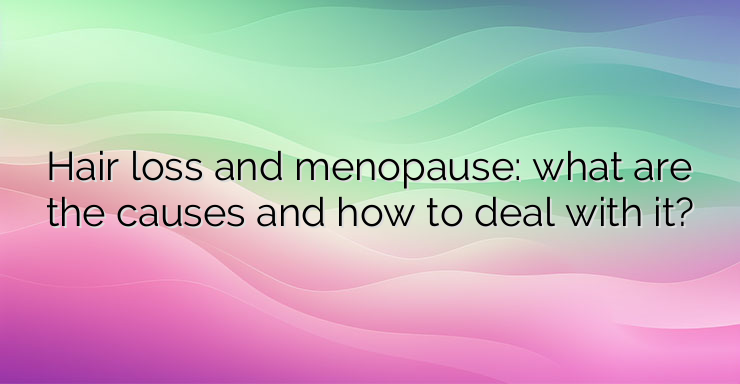Menopause is associated with many changes in a woman’s body and can have an impact on hair health as well. Very often, after entering menopause, women notice a change in the structure and vitality of their hair. Sometimes the cause is dryness of the capillaries, which can be easily controlled with the use of moisturizing and nourishing products. If the hair becomes finer, breaks easily and becomes flyaways, the solution is a trim for better hair control. Significant hair loss is referred to as alopecia. Changes in hair health in middle and old age are more pronounced in men than in women. Even if significant hair loss is not observed, the hair changes and thus changes the overall appearance of the personality. Why does hair loss occur during menopause? After the age of 40, women can already start to notice that their hair is changing. The reason for this is the progressive decline in estrogen levels. The condition worsens when menopause approaches and the ovaries stop producing this hormone. Low estrogen levels are compensated by increasing testosterone levels. What type of hair loss is characteristic of menopause? An increase in testosterone levels can increase the risk of developing androgenetic alopecia – it is typical for men, although it can also develop in women. It has been found that 15% of women before the age of 40 and almost 40% of them after menopause are affected by androgenetic alopecia. This alopecia in them does not lead to total hair loss, but there is a loss of hair density and the appearance of lighter areas, mainly on the upper part of the scalp due to the breakdown of hair follicles. Another type of hair loss that can occur in postmenopausal women is frontal fibrosing alopecia – the hair loss develops like a headband, causing the hair to recede linearly from the ears and forehead back. It is thought to be autoimmune in origin, but most commonly develops after menopause. What are the signs of menopausal alopecia? Loss of hair density; Increased hair loss; Dry and brittle hair; Lack of shine; Change in hair texture; Lifestyle and nutrition are key to avoid nutritional deficiencies that can worsen hair loss. How to deal with hair loss during menopause? Hair mesotherapy – the procedure consists of subcutaneous injection of numerous substances – amino acids, vitamins, minerals, hyaluronic acid, platelet-rich plasma, which prevent hair loss and improve the quality and health of hair. Capillary laser – stops hair loss and restores hair strength and density. Minoxidil – this is the only approved drug against hair loss. It must be taken with a doctor’s prescription. Hair Transplantation – Hair transplantation is a definitive solution to alopecia, for both men and women. References: https://www.sabervivirtv.com/actualidad/caida-pelo-menopausia-tratamientos-funcionan-mejor_4979


Leave a Reply